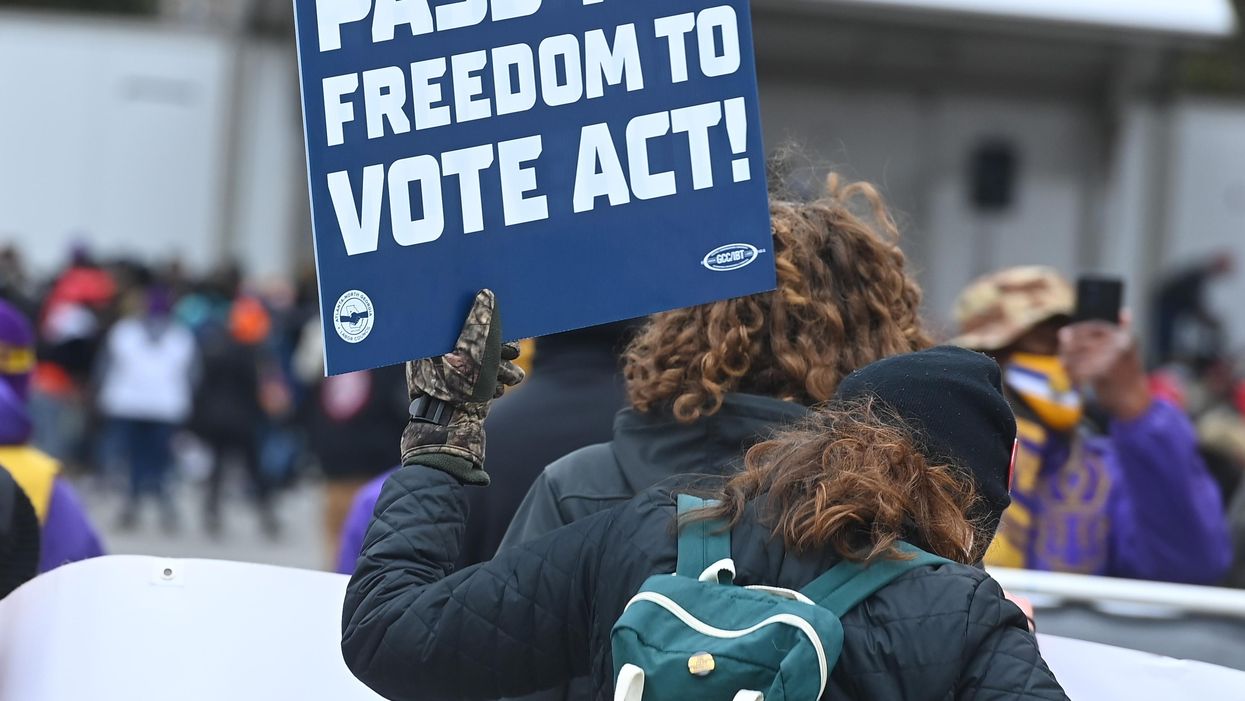Even though Democrats’ two signature election reform bills have once again been defeated in the Senate, advocates for change are vowing to press ahead on multiple fronts.
Republicans, as expected, blocked passage of the combined Freedom to Vote Act and John R. Lewis Voting Rights Advancement Act on Wednesday night. And Democrats’ effort to change the filibuster went down immediately after, as moderates Joe Manchin and Kyrsten Sinema sided with Republicans in blocking the rules change.
Now some advocates are focusing on a limited set of federal voting reforms while others are taking aim at state and local changes. And a bipartisan group of senators has been discussing a handful of ideas that might be achievable in the 50-50 Senate.
Regardless of the path forward, many advocates seem to agree with RepresentUs CEO Johsua Graham Lynn, who on Wednesday said: “While the Freedom to Vote: John R. Lewis Act is the best way to protect America’s democracy in this precarious moment, it’s not the only way.”
A collection of five organizations that represent the left, right and cross-partisan communities released what is perhaps the most concrete proposal for moving forward on Thursday.
The Bipartisan Policy Center, Issue One, Unite America, the R Street and the American Enterprise Institute issued a report, “ Prioritizing Achievable Federal Election Reform,” which proposes policies across four areas: voter registration, casting ballots, vote-counting, and cyber- and physical security.
“The proposals outlined in this report are rooted in a deep history of broad support across the political spectrum, but we will only cross the finish line if Republicans and Democrats are able to set aside partisan differences and do what’s right for our country,” said Issue One CEO Nick Penniman. “We cannot allow inaction to continue. Passing key bipartisan election reforms is absolutely crucial.”
But rather than mandating specific policies, like the Freedom to Vote Act would have done, the report suggests providing grants to states that engage in certain practices, such as:
- Regular maintenance of voter rolls.
- Automatic voter registration.
- Requiring a minimum standard for voter identification.
- Seven-day early voting period.
- Absentee voting options for all voters, with proper security measures.
- Requiring mailed ballots to be received by the time polls close on Election Day.
- Training and security for election workers.
“Elections must be trustworthy, and voting must be convenient,” said Matt Germer, R Street’s resident elections fellow. “This new legislative framework shows how long-standing Republican, Democratic and bipartisan priorities can work in harmony to improve our elections without overbearing federal mandates.”
While other groups also talk about continuing to work for federal reforms, much of their attention will be focused on state and local government in the days ahead.
“Though a path forward on the Freedom to Vote: John R. Lewis Act is unclear, we must continue the fight to protect voting rights city by city, state by state, and in the halls of Congress,” Jen Johnson, movement director for RepresentUs, wrote to supporters when inviting them to a strategy session next week.
That strategy includes stepping up what has been a successful series of state and local campaigns to pass anti-corruption and structural reforms, continuing to advocate for federal reforms, and launching a new effort to protect election administration.
“We'll create a countervailing force to the authoritarians/conspiracists in swing states who are trying to take over and ultimately subvert election administration,” said Ross Sherman, a spokesman for RepresentUs. “We are building the kind of deep relational organizing network that has proven to be a winning strategy, paired with recruitment and deployment of military veterans (Count Every Hero), the business community and faith leaders. We are coordinating closely with partners on this work.”
Similarly, the Campaign Legal Center will continue its work, one case at a time.
“Through litigation and work in the states, groups like Campaign Legal Center and our allies have already been scoring wins on multiple fronts in fights against gerrymandering and numerous barriers to voting,” said CLC President Trevor Potter. “Although these wins are mostly incremental, local wins and state work are critical as we push forward.“
Meanwhile, a handful of Republican and Democratic senators have been in talks about a few legislative ideas that could garner bipartisan support. Chief among them would be changes to the Electoral Count Act, which governs the role Congress and the vice president have in the certification of electoral votes.
Some supporters of Donald Trump wanted to take advantage of the bill’s vague language to undermine the process and keep him in office following the 2020 election. It should be nothing more than a ceremonial process, according to David Becker, executive director of the Center for Election Innovation and Research.
“It’s most akin to the Oscars,” he explained. “They don't vote on Best Picture at the Oscars. They just open the envelope and annonce who won.”
Becker also backed another issue under discussion in the Senate. “I think we do need to see some protection for election workers,” he said, adding that there should be criminal penalties for offenders.
Meanwhile, for some, the battle for the Freedom to Vote Act and the John Lewis Voting Rights Advancement Act is not over.
“Today’s shameful outcome revealed who stands for, and who against democracy,” Derrick Johnson, president and CEO of the NAACP, said Wednesday. “The Voting Rights Act of 1965 took three attempts to pass into law, so we will continue to fight. Anything short of protecting the right to vote is a death sentence for democracy. The fight is far from over.”




















